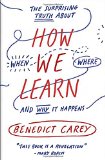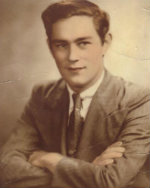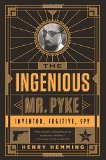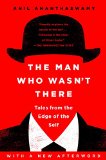Summary | Excerpt | Reviews | Beyond the book | Read-Alikes | Genres & Themes | Author Bio

Critics' Opinion:
Readers' Opinion:
First Published:
Sep 2014, 272 pages
Paperback:
Jun 2015, 272 pages
 Book Reviewed by:
Book Reviewed by:
Kate Braithwaite
Buy This Book
In the tradition of The Power of Habit and Thinking, Fast and Slow comes a practical, playful, and endlessly fascinating guide to what we really know about learning and memory today—and how we can apply it to our own lives.
From an early age, it is drilled into our heads: Restlessness, distraction, and ignorance are the enemies of success. We're told that learning is all self-discipline, that we must confine ourselves to designated study areas, turn off the music, and maintain a strict ritual if we want to ace that test, memorize that presentation, or nail that piano recital.
But what if almost everything we were told about learning is wrong? And what if there was a way to achieve more with less effort?
In How We Learn, award-winning science reporter Benedict Carey sifts through decades of education research and landmark studies to uncover the truth about how our brains absorb and retain information. What he discovers is that, from the moment we are born, we are all learning quickly, efficiently, and automatically; but in our zeal to systematize the process we have ignored valuable, naturally enjoyable learning tools like forgetting, sleeping, and daydreaming. Is a dedicated desk in a quiet room really the best way to study? Can altering your routine improve your recall? Are there times when distraction is good? Is repetition necessary? Carey's search for answers to these questions yields a wealth of strategies that make learning more a part of our everyday lives - and less of a chore.
By road testing many of the counterintuitive techniques described in this book, Carey shows how we can flex the neural muscles that make deep learning possible. Along the way he reveals why teachers should give final exams on the first day of class, why it's wise to interleave subjects and concepts when learning any new skill, and when it's smarter to stay up late prepping for that presentation than to rise early for one last cram session. And if this requires some suspension of disbelief, that's because the research defies what we've been told, throughout our lives, about how best to learn.
The brain is not like a muscle, at least not in any straightforward sense. It is something else altogether, sensitive to mood, to timing, to circadian rhythms, as well as to location and environment. It doesn't take orders well, to put it mildly. If the brain is a learning machine, then it is an eccentric one. In How We Learn, Benedict Carey shows us how to exploit its quirks to our advantage.
Chapter One
The Story Maker
The Biology of Memory
The science of learning is, at bottom, a study of the mental muscle doing the work—the living brain—and how it manages the streaming sights, sounds, and scents of daily life. That it does so at all is miracle enough. That it does so routinely is beyond extraordinary.
Think of the waves of information rushing in every waking moment, the hiss of the kettle, the flicker of movement in the hall, the twinge of back pain, the tang of smoke. Then add the demands of a typical layer of multitasking—say, preparing a meal while monitoring a preschooler, periodically returning work emails, and picking up the phone to catch up with a friend.
Insane.
The machine that can do all that at once is more than merely complex. It's a cauldron of activity. It's churning like a kicked beehive.
Consider several numbers. The average human brain contains 100 billion neurons, the cells that make up its gray matter. Most of these cells link to ...
The book is perhaps not as "surprising" as the subtitle claims and at the end of the text there is an appendix of eleven essential questions that covers most of the author's actual advice on how to learn. But to only read the appendix would be to miss out. How We Learn is witty and informative, clearly well grounded by the author's depth of knowledge...continued
Full Review
(844 words)
This review is available to non-members for a limited time. For full access,
become a member today.
(Reviewed by Kate Braithwaite).
One of the many stories from the history of research into memory and learning related by Benjamin Carey in How We Learn is the story of a man known to science and the world until his death in 2008 only by his initials, H.M.
 When Henry Molaison of Hartford Connecticut, born in 1926, was 27 years old, he agreed to undergo brain surgery to alleviate his epilepsy. Since a childhood cycling accident, Henry had suffered from debilitating seizures. The experimental operation, carried out in 1953, did significantly help with Henry's epilepsy, but this partial lobotomy left him with severe amnesia. Quite unintentionally, the operation proved to the scientific world that the hippocampus and medial temporal lobes are where the brain ...
When Henry Molaison of Hartford Connecticut, born in 1926, was 27 years old, he agreed to undergo brain surgery to alleviate his epilepsy. Since a childhood cycling accident, Henry had suffered from debilitating seizures. The experimental operation, carried out in 1953, did significantly help with Henry's epilepsy, but this partial lobotomy left him with severe amnesia. Quite unintentionally, the operation proved to the scientific world that the hippocampus and medial temporal lobes are where the brain ...
This "beyond the book" feature is available to non-members for a limited time. Join today for full access.

If you liked How We Learn, try these:

by Henry Hemming
Published 2016
The untold story of an enigmatic genius who changed warfare forever.

by Anil Ananthaswamy
Published 2016
A tour of the latest neuroscience of schizophrenia, autism, Alzheimer's disease, ecstatic epilepsy, Cotard's syndrome, out-of-body experiences, and other disorders—revealing the awesome power of the human sense of self from a master of science journalism





The Funeral Cryer by Wenyan Lu
Debut novelist Wenyan Lu brings us this witty yet profound story about one woman's midlife reawakening in contemporary rural China.
Your guide toexceptional books
BookBrowse seeks out and recommends the best in contemporary fiction and nonfiction—books that not only engage and entertain but also deepen our understanding of ourselves and the world around us.